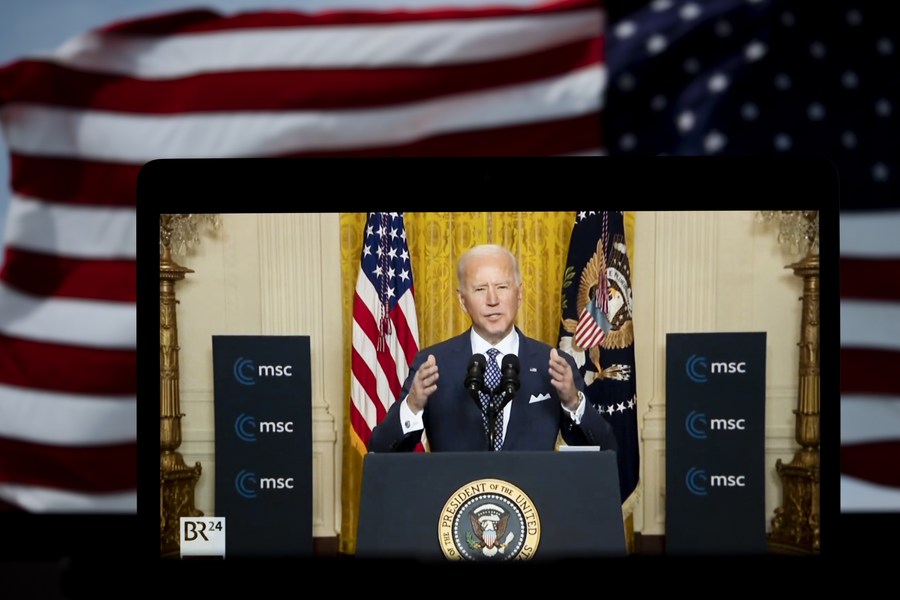Following Xi-Biden call, anticipation mounts on improved China-U.S. ties
Xinhua,February 23, 2021 Adjust font size:

Chinese State Councilor and Foreign Minister Wang Yi delivers a speech at the opening of the Lanting Forum with the theme of "Promoting Dialogue and Cooperation and Managing Differences: Bringing China-U.S. Relations Back to the Right Track" in Beijing, capital of China, Feb. 22, 2021. (Xinhua/Yue Yuewei)
BEIJING, Feb. 22 (Xinhua) -- Following the telephone conversation between Chinese President Xi Jinping and U.S. President Joe Biden on Feb. 11 ahead of the Chinese Lunar New Year, the global community has seen several positive signals on China-U.S. ties.
At the Lanting Forum, held in Beijing on Monday, leading figures including high-level officials and experts from the two countries and beyond gave their insights on how to bring the China-U.S. relationship back onto the right track.
COMPETITION WITHOUT CONFRONTATION
Acknowledging that the China-U.S. relationship is going to be "competitive in every domain," Henry Paulson, former secretary of the U.S. Treasury Department, called for minimizing the likelihood of debilitating conflict while making progress on areas of mutual interest.
"The United States and China are going to be locked into strategic competition for a long time. So it is in each of our interests that competition would be as healthy as possible without unnecessary confrontation," he said, adding that the two countries must decide how and where to compete and how to avoid conflicts.
Former Australian Prime Minister Kevin Rudd, who is now president and CEO of Asia Society, believes that the years ahead will be "a make-or-break decade" for China-U.S. relations, as the competition between the two countries for global leadership will intensify.
"The hard truth is that no relationship can ever be managed unless there is a basic agreement between the parties on the terms of their management," he said.

Photo taken in Arlington, Virginia, the United States, on Feb. 19, 2021 shows a screen displaying U.S. President Joe Biden speaking in Washington, D.C. (Xinhua/Liu Jie)
Rudd proposed the concept of "managed strategic competition," which involves three pillars: establishing certain hard limits on each country's security policy; accepting the reality of continuing competition for strategic and economic influence; and finding room for continued strategic cooperation on critical global challenges.
"For example, the one-China policy as articulated in the joint communiques between the United States and China is critical. Ending the Trump administration's unnecessarily provocative actions on Taiwan will be important," Rudd said when elaborating on "hard limits."
COOPERATION BENEFICIAL TO ALL
"Both nations need to recognize that cooperation between our two countries is the best way to resolve any differences that exist," said Maurice Greenberg, chairman of C.V. Starr & Co., Inc. and Starr Foundation, founding chairman and former CEO of American International Group.
Citing his experiences in doing business in China over the past 40 years, Greenberg said that both sides have benefitted from their companies doing business in the other country, as has the world at large. "I hope that both nations can continue to benefit from each other, not only in their national interests, but benefiting many others as well."
Paulson noted that there are problems that the two countries simply cannot mitigate or solve without at least some coordination, if not cooperation.
"These are issues from stopping financial contagion to denuclearization, to averting environmental catastrophe," he said, adding that what matters is whether something is good for the two peoples.
Given the U.S. pledge to join COVAX, an international initiative aimed at ensuring equitable access to COVID-19 vaccines across the world, Paulson called on the two countries to coordinate and work with others, not least Japan, Europe and India, on vaccination distribution.
 A COVID-19 vaccination spot opens for public in Oakland, California, the United States, Feb. 16, 2021. (Photo by Li Jianguo/Xinhua)
A COVID-19 vaccination spot opens for public in Oakland, California, the United States, Feb. 16, 2021. (Photo by Li Jianguo/Xinhua)
In terms of tackling global challenges, Rudd said that climate change, combating the pandemic, improving public health, global economic recovery, green recovery, financial stability, and nuclear arms control are examples of areas where cooperation will be necessary, "not just for the world's interests, but to secure both China's and America's national interests as well."
CORRECT STRATEGIC PERCEPTION
"There must be a correct strategic perception; otherwise, one mistake would only be replaced by another," said Cui Tiankai, Chinese ambassador to the United States.
He called on some people in the United States to get rid of their paranoia about China. "It is time for them to stop creating an imaginary enemy out of China and making any self-fulfilling prophecy. It is time for them to abandon the antiquated mindset of zero-sum game and obsession with the Thucydides Trap."
Cui noted that some people in the United States are inclined to use their own definition of "democracy" and other values to draw the line, and label other countries according to their own preferences and standards.
"It is hoped that America will have a correct mindset, live up to the principle that all countries 'are created equal', and learn to peacefully coexist with those who have a different history, culture, development path and system," he said.
Cui also called on the two countries to have a real knowledge of and respect for each other's history, culture and development path. "A key to understanding an ancient civilization as China is its history and culture, including its deep-rooted belief in 'harmony' and its tradition of establishing both oneself and others."
This year marks the centenary of the Communist Party of China. "Knowing about these 100 years is essential to knowing about China's past, present and future," Cui said. ■
207c2dfb-6fa5-45a2-90ee-801753216741.jpg)
